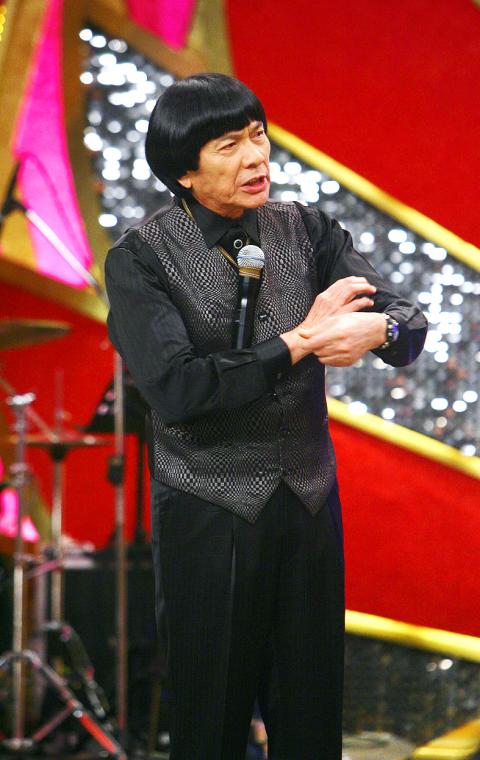Taiwanese director Yeh Tien-lun (葉天倫), whose movie Night Market Hero (雞排英雄) will soon be released in China, said on Wednesday he hoped the film would give Chinese audiences a glimpse of Taiwanese culture before they visit the country.
“Many [Chinese] want to visit this beautiful island, but since there is still a quota for independent travelers and they need to apply, I believe people who have not had the chance to come to Taiwan will be keen to see the film first,” the 36-year-old director said at a press conference in Taipei ahead of his departure for China to promote the movie.
“I can say Night Market Hero is almost like a promotional film for Taiwan’s night market gourmets. I hope the country’s night markets, cuisine and hospitality can be seen by more people,” he said.

Photo: CNA
It will be the first Taiwanese movie to open in China since the Economic Cooperation Framework Agreement (ECFA) was signed in June last year. The agreement frees Taiwanese films from China’s import quota of 50 movies per year. Previously, Taiwanese films had to compete with other foreign movies for entry into the Chinese market.
Night Market Hero, which made NT$140 million (US$4.85 million) at the box office in Taiwan, is about a group of night market vendors whose lives are filled with petty rivalries and quarrels until they unite to save their market from a group of politicians and property developers.
The comedy will be screened in 14 major cities starting on Tuesday, including Beijing, Shanghai, Chongqing and Guangzhou.

Photo: Hu Shun-hsiang, Taipei Times
The two leads — Blue Lan (藍正龍) and Alice Ko (柯佳嬿) — will also take part in the promotional tour to Beijing and Fuzhou, Yeh said.
“Many Chinese netizens have written on my blog that they have been looking forward to seeing the film after watching the trailer. They have also said they hope they can visit Taiwan soon,” Ko said.
Asked about what kind of box office performance he would consider successful, Yeh said he “would be satisfied with 10 million yuan [US$1.5 million].”
The rights to the movie have been sold to China’s leading distributor, Bona Film Group.
Cape No. 7 (海角七號), a Taiwanese film that screened in China in 2008, earned about 30 million yuan.
Yeh said 10 million yuan might not seem like a lot in China, but in Taiwan the movie would be considered a blockbuster.

A preclearance service to facilitate entry for people traveling to select airports in Japan would be available from Thursday next week to Feb. 25 at Taiwan Taoyuan International Airport, Taoyuan International Airport Corp (TIAC) said on Tuesday. The service was first made available to Taiwanese travelers throughout the winter vacation of 2024 and during the Lunar New Year holiday. In addition to flights to the Japanese cities of Hakodate, Asahikawa, Akita, Sendai, Niigata, Okayama, Takamatsu, Kumamoto and Kagoshima, the service would be available to travelers to Kobe and Oita. The service can be accessed by passengers of 15 flight routes operated by

Chinese spouse and influencer Guan Guan’s (關關) residency permit has been revoked for repeatedly posting pro-China videos that threaten national security, the National Immigration Agency confirmed today. Guan Guan has said many controversial statements in her videos posted to Douyin (抖音), including “the red flag will soon be painted all over Taiwan” and “Taiwan is an inseparable part of China,” and expressing hope for expedited reunification. The agency last year received multiple reports alleging that Guan Guan had advocated for armed reunification. After verifying the reports, the agency last month issued a notice requiring her to appear and explain her actions. Guan

GIVE AND TAKE: Blood demand continues to rise each year, while fewer young donors are available due to the nation’s falling birthrate, a doctor said Blood donors can redeem points earned from donations to obtain limited edition Formosan black bear travel mugs, the Kaohsiung Blood Center said yesterday, as it announced a goal of stocking 20,000 units of blood prior to the Lunar New Year. The last month of the lunar year is National Blood Donation Month, when local centers seek to stockpile blood for use during the Lunar New Year holiday. The blood demand in southern Taiwan — including Tainan and Kaohsiung, as well as Chiayi, Pingtung, Penghu and Taitung counties — is about 2,000 units per day, the center said. The donation campaign aims to boost

The Central Weather Administration (CWA) said a magnitude 4.9 earthquake that struck off the coast of eastern Taiwan yesterday was an independent event and part of a stress-adjustment process. The earthquake occurred at 4:47pm, with its epicenter at sea about 45.4km south of Yilan County Hall at a depth of 5.9km, the CWA said. The quake's intensity, which gauges the actual effects of a temblor, was highest in several townships in Yilan and neighboring Hualien County, where it measured 4 on Taiwan's seven-tier intensity scale, the CWA said. Lin Po-yu (林柏佑), a division chief at the CWA's Seismological Center, told a news conference